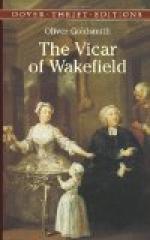|
This section contains 7,356 words (approx. 25 pages at 300 words per page) |

|
SOURCE: "The Redemption of Fatherhood in The Vicar of Wakefield" in Studies in English Literature, 1500-1900, Vol. 23, No. 3, Summer, 1983, pp. 465-80.
In the essay below, Hilliard argues that The Vicar of Wakefield is a realistic account of fatherhood and an allegory about sin and redemption.
The Vicar's many sanguine remarks on matrimony—"I wrote several sermons to prove its happiness,"1 he says—are contradicted by his narrative, from beginning to end an account of the troubles which beset a man who has undertaken to marry and bring up a large family. Though Dr. Primrose is given to celebrating domestic life as a "concert," his story can be read as a succession of marital disputes (over such parental concerns as the treatment accorded the suitor of a daughter) which he generally loses to Deborah, his domineering wife. As spiritual "instructor" to a family whose members are "refractory and ungovernable...
|
This section contains 7,356 words (approx. 25 pages at 300 words per page) |

|


